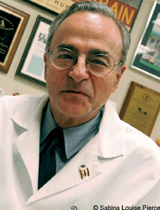PHILADELPHIA — Four professors from the Perelman School of Medicine have been elected members of the Institute of Medicine (IOM), one of the nation's highest honors in biomedicine, with a total of six representing four schools at the University of Pennsylvania.
The new members bring Penn Medicine’s total to 61. The newly elected members raise IOM's total active membership to 1,732 and the number of foreign associates to 112. With an additional 84 members holding emeritus status, IOM's total membership is 1,928.
Established in 1970 by the National Academy of Sciences, IOM has become recognized as a national resource for independent, scientifically informed analysis and recommendations on health issues. With their election, members make a commitment to volunteer their service on IOM committees, boards, and other activities.
The new Penn IOM members:

Gustavo D. Aguirre, V.M.D., Ph.D., is a professor of Medical Genetics and Ophthalmology, School of Veterinary Medicine. He has led efforts to develop gene therapy to treat various forms of blindness. Modeling the visual disorders in dogs, he and colleagues have cured retinal degeneration in the animals—breakthroughs that have laid the groundwork for human clinical trials. Aguirre earned his undergraduate, veterinary and doctoral degrees from Penn. He is the recipient of numerous honors and awards for his work, including an honorary Doctor of Philosophy degree from the University of Göteborg, Sweden; the WSAVA/Waltham International Award for Scientific Achievement; the Foundation Fighting Blindness Trustee Award and Scientist of the Year Award; the O.N.C.E. International Prize for R&D in Biomedicine and New Technologies for the Blind; and the Paul Kayser International Award in Retina Research. He was recently elected a Fellow of the Association for Research in Vision and Ophthalmology.

Shelley L. Berger, Ph.D., is a Penn Integrates Knowledge Professor and Daniel S. Och University Professor, in the Department of Cell and Developmental Biology and Department of Genetics, Perelman School of Medicine, and in the Department of Biology, School of Arts and Sciences. She also serves as Director of the Epigenetics Program at the Perelman School. Berger earned her B.S. and Ph.D. degrees from the University of Michigan; was a post-doctoral fellow at Massachusetts Institute of Technology; and was previously Hilary Koprowski Endowed Professor at Wistar Institute. Her work advanced understanding of eukaryotic gene regulation by helping to unify the fields of transcription and chromatin regulation. The major focus of her research is to define the mechanisms by which epigenetic modifications affect chromatin structure (the combination of DNA and proteins found in chromosomes) and gene expression in normal and diseased states, in particular, during chromatin remodeling in spermatogenesis, senescence and aging, and underlying organismal-level behavior. Her work has also elucidated modifications of the tumor suppressor p53 and whether its alterations are central to oncogenesis. Berger has organized numerous international meetings on chromatin; has served as Senior Editor of the journal Molecular and Cellular Biology; and participates on advisory committees for several research institutions and chromatin-focused pharmaceutical and biotechnology companies. She has served on international committees to establish nomenclature for histone-modifying enzymes, and to create the NIH-sponsored Human Epigenome Project. She is also lead investigator on an NIH research award on Epigenetics and Aging and a recipient of the Ellison Foundation Senior Scholar Award in Aging.

Nancy M. Bonini, Ph.D., is the Florence R.C. Murray Professor of Biology in the Department of Biology, School of Arts and Sciences, and is an Investigator of the Howard Hughes Medical Institute. Her research uses the fruit fly Drosophila melanogaster to gain insight into neurodegenerative diseases, including Alzheimer’s, Parkinson’s, Huntington’s, and amyotrophic lateral sclerosis. By recreating features of these diseases in flies, her team has helped identify disease mechanisms and potential targets for ameliorating some of the damage they cause. Bonini received her Ph.D. in Neuroscience from the University of Wisconsin-Madison. She has earned multiple awards from the Huntington’s Disease Society of America and the Hereditary Disease Foundation, and in 2009 received an NIH EUREKA award for “highly innovative” research. Bonini is a Fellow of the American Association for the Advancement of Science and was recently elected a member of the National Academy of Sciences.

Carl H. June, M.D., is the Richard W. Vague Professor in Immunotherapy, Department of Pathology and Laboratory Medicine, Perelman School of Medicine, and the Program Director of Translational Research, Abramson Family Cancer Research Institute. His laboratory studies various mechanisms of lymphocyte activation relating to immune tolerance and adoptive immunotherapy. In 2011, his research team published findings detailing a new therapy in which patients with refractory and relapsed chronic lymphocytic leukemia were treated with genetically engineered versions of their own T cells. The treatment has now also been used with promising results to treat children with refractory acute leukemia. June is a graduate of the U.S. Naval Academy and Baylor College of Medicine. He had graduate training in immunology and malaria at the World Health Organization, Geneva, Switzerland, and post-doctoral training in transplantation biology at the Fred Hutchinson Cancer Research Center. June has received numerous awards and grants for his innovative work, including a Bristol-Myers Squibb Company Freedom to Discover Research Grant; the William B. Coley Award from the Cancer Research Institute; the Ernest Beutler Prize from the American Society of Hematology; and The Joan Miller and Linda Bernstein Gene Therapy Ovarian Cancer Award from the Alliance for Cancer Gene Therapy.

Mitchell D. Schnall, M.D., Ph.D., is the Eugene P. Pendergrass Professor of Radiology, and the Chair of the Radiology Department, Perelman School of Medicine. He received his undergraduate degree, medical degree, and Ph.D. from Penn. Schnall is an international leader in translational biomedical imaging research. His work has led to fundamental changes in the imaging approaches to breast and prostate cancer. In addition, he has had a significant influence on emerging technologies, such as optical imaging. Schnall has played a critical role in efforts to organize cancer clinical and translational imaging research in the U.S. and has been the principal investigator of numerous team-science initiatives. He served as Deputy Chair of the American College of Radiology Imaging Network (ACRIN) from 1999-2007, and in 2008 became ACRIN Chair. Under his leadership, ACRIN completed the landmark National Lung Cancer Screening trial that demonstrated the ability of low-dose CT lung cancer screening to reduce lung cancer mortality by 20% in high risk patients. Schnall was one of the architects of the merger of the Eastern Cooperative Oncology Group (ECOG) and ACRIN to form the new ECOG-ACRIN Cancer Research Group, which he now co-chairs. He is also a member of the American Society for Clinical Investigation and the Association of American Physicians.

Kevin G.M. Volpp, M.D., Ph.D., is the founding Director of the Center for Health Incentives and Behavioral Economics at the Leonard Davis Institute; Co-Director of the Penn Medicine Center for Innovation, and a Professor of Medicine at the Perelman School of Medicine and Health Care Management at the Wharton School. He is also the Director of the NIH-funded Penn CMU Roybal P30 Center in Behavioral Economics and Health, one of two such NIH- funded centers in the U.S. Volpp’s research on the impact of financial and organizational incentives on health behavior and health outcomes has been recognized by numerous awards including the Presidential Early Career Award for Scientists and Engineers; the Alice S. Hersh New Investigator Award from AcademyHealth; Time Magazine’s 2009 A-Z “Advances in Health” list for work on Incentives – letter “I”; the British Medical Journal Group Award for translating Research into Practice, and the outstanding paper of the year from the Society of General Internal Medicine. He is a member of the editorial board of the Annals of Internal Medicine. He did his medical training at Penn and Brigham and Women’s hospital, has a Ph.D. in Applied Economics and Managerial Science from the Wharton School, and is a staff physician at the Philadelphia Veterans Affairs Medical Center.
Penn Medicine is one of the world’s leading academic medical centers, dedicated to the related missions of medical education, biomedical research, excellence in patient care, and community service. The organization consists of the University of Pennsylvania Health System and Penn’s Raymond and Ruth Perelman School of Medicine, founded in 1765 as the nation’s first medical school.
The Perelman School of Medicine is consistently among the nation's top recipients of funding from the National Institutes of Health, with $550 million awarded in the 2022 fiscal year. Home to a proud history of “firsts” in medicine, Penn Medicine teams have pioneered discoveries and innovations that have shaped modern medicine, including recent breakthroughs such as CAR T cell therapy for cancer and the mRNA technology used in COVID-19 vaccines.
The University of Pennsylvania Health System’s patient care facilities stretch from the Susquehanna River in Pennsylvania to the New Jersey shore. These include the Hospital of the University of Pennsylvania, Penn Presbyterian Medical Center, Chester County Hospital, Lancaster General Health, Penn Medicine Princeton Health, and Pennsylvania Hospital—the nation’s first hospital, founded in 1751. Additional facilities and enterprises include Good Shepherd Penn Partners, Penn Medicine at Home, Lancaster Behavioral Health Hospital, and Princeton House Behavioral Health, among others.
Penn Medicine is an $11.1 billion enterprise powered by more than 49,000 talented faculty and staff.